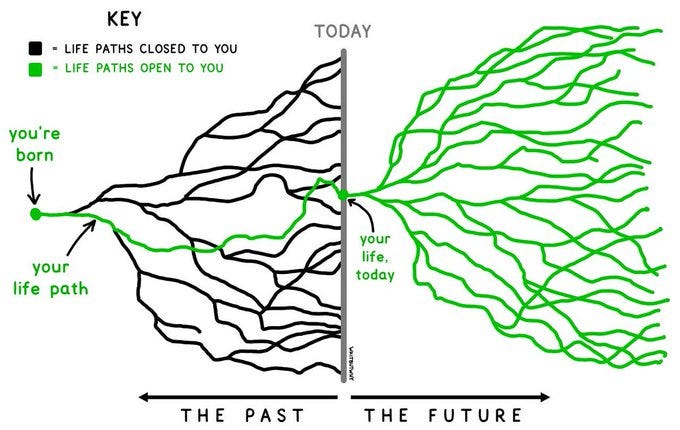Unfolding
blogging as receipts
Well, it's been a few weeks now since I decided to switch to a weekly posting schedule from a daily one. I don't feel great about it so far – I definitely haven't been using the extra time to further develop ideas/drafts that I then post at the end of the week. To be fair to myself, I have been working on various writing-adjacent things, but they've been more loose & I haven't put the effort into actually finishing out the research. Also, we moved from Virginia to LA two weeks ago, and I got pretty sick after an international wedding last weekend. But still, it doesn't feel great. Part of me thinks that the fact that I don't feel naturally pulled to write on a daily basis means that maybe I should do other things, while another part thinks back on some of the previous posts I wrote that I am at least somewhat proud of. Classic internal conflict.
I have been letting thoughts like these rattle around the last few days as I've been listless and unable to focus while sick, and have tried to return to the idea that ultimately I am writing for myself. This is perhaps obvious given the minimal editing. But it's surprisingly hard to keep in mind; I often find myself wanting to write something because it's what someone who has lofty interests would want to write. Wanting to want to write something interesting. This almost invariably leads to working on something that I end up not enjoying doing, and was actually easier to avoid when I was forced to write daily, as there simply wasn't time to do things like this.
What has "writing for myself" actually meant so far? An unexpected side effect has been the ability to look back at what I have written, which has provided a clearer view of myself, in a much more rigid way than standard ephemeral self-reflective thoughts. Normally, a thought comes up "I am X", you probably don't think about it too hard, and then move on. Now there are receipts. Along the same lines, I have a note on my phone titled "Lovingly curious investigation into myself" where I've just been noting down things that make me feel alive. Some current entries are "all racket sports", "wandering around parks!!", "just being in the sun in general". As another modality, I also have a Project in Claude where I copy in all of my posts as the source material, and then ask various questions. I have asked Claude for common threads on what I feel pulled towards doing, ideas for things that would probably resonate with what I like but are distinctly out of my comfort zone, and a few other things. This is a lot of self-reflection, much more than I'm used to or even really want to do, but my life is fully reset at the moment and I want it to fully reflect who I am moving forward.
The design process I want to follow is described in this post by
(highly highly recommend the full post & blog):If I look at things that have turned out well in my life (my marriage, some of my essays, my current career) the “design process” has been the same in each case. It has been what Christopher Alexander called an unfolding. Put simply:
I paid attention to things I liked to do, and found ways to do more of that. I made it easy for interesting people to find me, and then I hung out with them. We did projects together.
I kept iterating—paying attention to the context, removing things that frustrated me, and expanding things that made me feel alive.
Eventually, I looked up and noticed that my life was nothing like I imagined it would be. But it fit me.
This is also very similar to the Lily Pad Approach To Purpose. Importantly, it is almost the antithesis of executing a strict vision. A vision is a specific view that you are trying to impose onto reality. Rather, an unfolding is a repeated feedback loop between you and reality. Gardening and cultivation rather than a prescribed mechanical purpose.
The useful thing about defining good design as a form-context fit is that it tells you where you will find the form. The form is in the context.
To find a good relationship, you do not start by saying, “I want a relationship that looks like this”—that would be starting in the wrong end, by defining form. Instead you say, “I’m just going to pay attention to what happens when I hang out with various people and iterate toward something that feels alive”—you start from the context.
The context is smarter than you. It holds more nuance and information than you can fit in your head. Collaborate with it.
I really love this idea. It is one reason that I will continue to write, even though it sometimes causes discomfort – it improves my visibility into who I am & what I care about, which I can use to find the green line that fits me and my context the best.
If you cycle through this feedback loop ferociously for ten years, you will end up with a well-designed life. It will not look like you imagined it would. It will have unfolded around you, and you will struggle to wrap your head around how you ended up where you did.
You will have lost track of all the experiments and insights that led you to a fit. But the good news is that you don’t have to remember. The form does.
P.S. Sorry for all the navel gazing lately. I plan to write about topics besides myself next week once I’m no longer sick.


